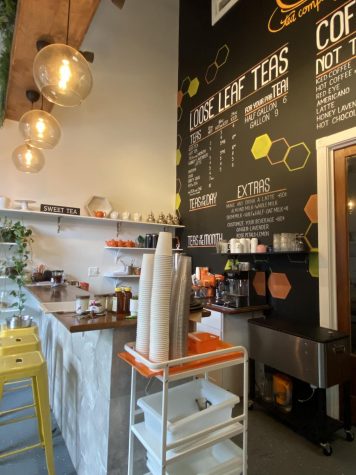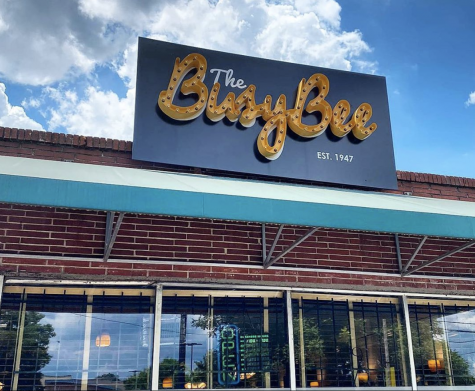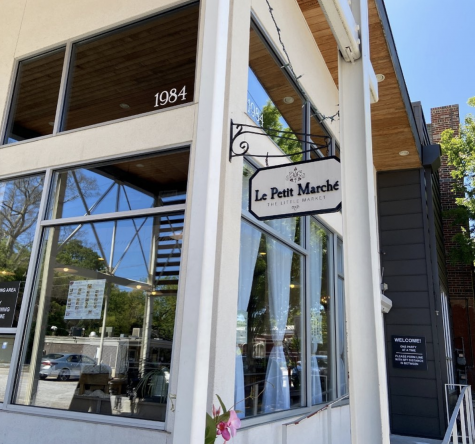Local black-owned businesses adjust to pandemic
September 27, 2020
The COVID-19 pandemic has taken a toll on small businesses across the world. Paired with the Black Lives Matter movement, there is a renewed emphasis on supporting small black-owned businesses. Just Add Honey Tea Shop, Busy Bee Cafe, and Le Petit Marche are three black-owned businesses in Atlanta that have felt the weight of the pandemic and local support in an effort to keep business going.
The three local businesses have made their mark in Atlanta. Busy Bee Cafe has made a name for itself as a fried-chicken place, and Just Add Honey Tea Shop offers unique tea experiences for customers. Brunch can feel like home at Le Petit Marche.
Brandi Shelton, Tracey Gates, and Marchet Sparks have all worked hard to keep their stores running during the economic impacts of COVID-19.
“Businesses are just shuttering left and right, businesses that have been around for 50 and 60 years are closing, and it’s just such a sad time for this industry,” Sparks said. “And so there’s just a period and a feeling of uncertainty, and it’s prolonged.
Though they have faced hardships, the owners are finding new ways to adapt and keep their businesses thriving.
Just Add Honey Tea Shop

“Here we might go grab a coffee with a friend … most people meet over a cup of tea in other cultures,” Shelton said. “I wanted to bring that energy in that love and repeat that and share it around the world, back to the U.S.”
Shelton doesn’t just have experience in fashion; her background ranges from finance at Bank of America to studying biomedical engineering at the Georgia Institute of Technology. As a native of New Orleans, Shelton has met people from all walks of life and enjoys living in Atlanta.
“It was a melting pot of all these people starting their lives or their adult lives in Atlanta,” Shelton said. “It was very fun to make friends from all over the world.”
In 2014, Shelton used her finance experience from working at Bank of America to found Just Add Honey Tea Shop in Edgewood, along with her husband Jermail.
While the Black Lives Matter movement has resulted in a push for attention on black-owned businesses, Shelton wants to emphasize the importance of always recognizing black-owned businesses.
“I know ‘black’ … and ‘black businesses matter’ is a hashtag right now … when we’ve always mattered,” Shelton said.
Shelton holds Just Add Honey to a high-quality standard and believes black business owners often have to overcome harmful stereotypes.
“It’s harder for us to walk into a bank to get a loan or the education just isn’t there,” Shelton said. “A lot of times black businesses don’t have … capital from family or information readily available to start and stay in businesses.”
Just Add Honey has adapted to the COVID-19 pandemic, which Shelton believes has allowed the shop to increase its creativity. The business offered free tea-making workshops, at-home tea parties and created tea blending kits to sell online.
Busy Bee Cafe

Gates paid careful attention to trends in food consumption, like pork, which she noticed wasn’t popular for a while. She narrowed the appeal of Busy Bee Cafe with specific dishes, like fried chicken.
“Taste has evolved, but the heavier Southern [foods] people only eat now in the winter,” Gates said. “But we needed a product we could sell every day .. .and I chose chicken.”
Gates has faced many challenges as an owner, but she finds her passion and drive for the restaurant make it worthwhile.
“It’s hard,” Gates said. “You never stop learning because the product changes … but it’s fun.”
Busy Bee Cafe has not reopened for dine-in, forcing unique circumstances, such as an overload of to-go orders and glove shortages. However, Gates has confidence in her business, having experienced all levels of success.
“I’ve been at every level,” Gates said. “When COVID-19 hit and I started looking at numbers, I said ‘well okay, I’ve been here before.’”
Gates’ next goal is to expand the cafe to a bigger facility, which could house more customers once they are open for dine-in. She has confidence in Busy Bee Cafe’s future as a staple restaurant in Atlanta.
“We are really that chicken place,” Gates said. “It’s pretty much a tourist attraction, part of Atlanta’s history.”
Le Petit Marche

Born in Los Angeles, California, Sparks previously worked as a real estate agent. After her two-week trip across the European countryside, Sparks wanted to recreate the cozy and clean feel of “le petit marche,” or “little market.” Not only did she love the aesthetic, but her name lined up perfectly.
Le Petit Marche was founded in 2008 in Kirkwood, Atlanta. It initially sold pantry items, local jars of honey and even skin-care products.
“The idea was just to have a little sandwich grab-and-go,” Sparks said. “My mom, at the time, was making the soups, so I had a crockpot full of her soup. And really, the prepared food aspect of the original Le Petit Marche was secondary.”
As the economic recession hit, Sparks examined what would keep her small business running. She had to focus on what was “paying the bills,” getting rid of retail items and focusing more on prepared food. She realized her sandwiches were popular.
The demand for customer and table space grew, and eventually, Le Petit Marche moved across the street to a bigger building in order to accommodate demand. It eventually became a full-fledged restaurant.
COVID-19 has rocked small businesses across the United States, and Le Petite Marche is no exception. Sparks and her employees are working hard to stay up and running.
“We’ve definitely had to pivot, like we did back in 2008,” Sparks said. “We did not have online ordering; we did not have delivery … and now we are totally having to adapt to online ordering and doing all these new things, which are challenging, but absolutely critical to the survival of our business.”
Even though Le Petite Marche has faced difficulties during its time, Sparks has felt continued support from her community and loves her business. She believes the community recognized the hard work she and her family have put into the restaurant and, in return, helped keep them afloat.
“There is a fabric here, and it’s just colorful and vivid and bright,” Sparks said. “It’s full of love and family — people love that feeling when they come in.”







